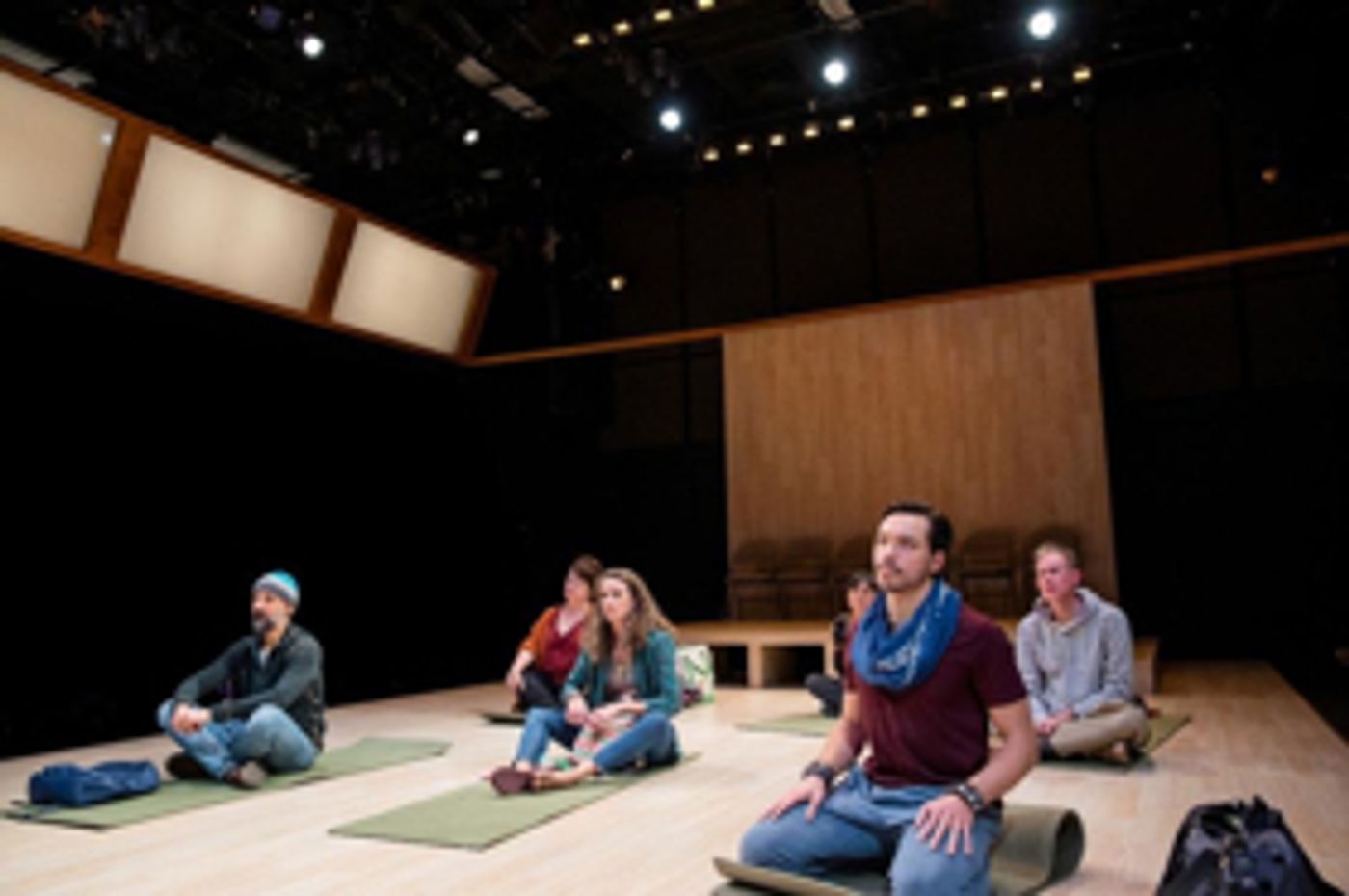Review: Sounds of Silence Resonate in SMALL MOUTH SOUNDS

Small Mouth Sounds
Written by Bess Wohl, Directed by M. Bevin O'Gara; Scenic Design, Cristina Todesco; Costume Design, Mary Lauve; Lighting Design, Annie Wiegand; Sound Design, Elizabeth Cahill; Production Stage Manager, Adele Nadine Traub; Assistant Stage Manager, John Meredith
CAST (in order of appearance): Barlow Adamson, Sam Simahk, Nael Nacer, Kerry A. Dowling, Celeste Oliva, Marianna Bassham, Gigi Watson
Performances through February 2 at SpeakEasy Stage Company, The Roberts Studio Theatre in the Calderwood Pavilion, Boston Center for the Arts, 527 Tremont Street, Boston, MA; Box Office 617-933-8600 or www.SpeakEasyStage.com
Anyone who has yet to land on a good idea for a simple New Year's resolution might like to try this one on for size: practice silence. Simple, yes, but not so easy in our fast-paced, overstuffed culture of cacophony. Counterintuitively, it may be more effective to capture attention by being silent than by shouting, perhaps because silence demands more of the listener. Playwright Bess Wohl experiments with this concept in Small Mouth Sounds, her 2015 Off-Broadway comedy now having its Boston premiere at SpeakEasy Stage Company, under the masterful direction of M. Bevin O'Gara.
On loan from her post as Producing Artistic Director of Kitchen Theatre Company in Ithaca, NY, O'Gara (a former Associate Producer for the Huntington Theatre) gets the most from an ensemble cast made up of some of the most talented individuals to grace our local stages. Understanding the unique challenges of directing a play with limited dialogue, O'Gara tacitly enlists the cooperation of the audience by employing stadium seating on three sides of the stage, in effect creating a nurturing embrace of the characters whose vulnerability is starkly on display. Lacking words to lean on or hide behind, each actor bares their inner persona in order to nonverbally convey thoughts and feelings, "loudly" enough to reach the back of the house.
Small Mouth Sounds invites us to observe a group of six strangers on a week-long spiritual retreat in the woods, each of them seeking relief from some personal anguish. Guided by the words and questionable wisdom of an unseen guru, they are to eschew technology, comforts of daily living, and, most difficult of all, the luxury of communicating by spoken word. The characters, and the actors playing them, have to be creative and dig deep to put their points across, and they all have to listen "harder" and observe every little nuance to understand each other. It is an unexpected pleasure to discover how much humor and pathos can be communicated without dialogue, but eye rolling and frustrated expulsions of air can say more than a thousand words, especially when performed by this stellar troupe [Barlow Adamson (Jan), Sam Simahk (Rodney), Nael Nacer (Ned), Kerry A. Dowling (Joan), Celeste Oliva (Judy), and Gigi Watson (Alicia)].
Conversely, we hear, but do not see, The Teacher (Marianna Bassham), the guru who addresses the seekers over a loudspeaker. Whereas the six actors onstage show us everything with their physical presence and interactions with each other, Bassham has only the use of her voice to tell her story. Her portrayal follows an arc from placid and controlled, to sarcastic and annoyed, to pitiful and panicked, with several stops along the way. Despite not appearing in the flesh, she commands the arena and captures the imagination of her charges, drawing a mixed response of reverence and dissatisfaction from them.
Taking into account the necessary evil of theater in the semi-round (someone is always facing away from a portion of the audience), the choice is validated by the intimacy it affords and the sense that all of us are part of the retreat. The downside is missing out on some of the facial expressions that are so vital in the absence of dialogue, but with acting this good, a missed tic or cue barely takes away from the overall experience. In a play that is strongly character-driven, Wohl provides lengthy back stories at the beginning of the script and extensive stage directions. The playwright's attention to details informs the actors' work as they find ways to inhabit their characters and, although the audience is not privy to this information, we are able to intuit what we need to know if we listen hard enough.
Costume designer Mary Lauve and props master Kaitlyn Burke get an assist for their work in helping to define the characters by what they wear and what they carry. Cristina Todesco's scenic design is a simple, zen-like space with warm lighting effects by Annie Wiegand. Elizabeth Cahill provides appropriate music and gong sounds that are evocative of a meditation session, as well as verboten cell phone and voice mail recordings. The teacher's loudspeaker produces sufficient volume, but the clarity is uneven. O'Gara makes good use of the reconfigured Roberts Studio Theatre with the actors approaching and exiting from all four corners of the set, as well as blocking scenes throughout the space.
It's no secret that most of us are uncomfortable with silence - we even use the term "awkward" to describe that state of being when we have little to say in the company of others. However, silence isn't much more acceptable in solitude as we are usually plugged into some device or playing the television just for background noise. To experience the world of Small Mouth Sounds is to have an opportunity to sit with someone else's struggle with silence, but to share in it, as well. It's a ton of fun, even if there are moments of discomfort, and it might give you the resolution you've been seeking.
Photo credit: Nile Scott Studios (Nael Nacer, Kerry A. Dowling, Gigi Watson, Celeste Oliva, Sam Simahk, Barlow Adamson)
Reader Reviews
Videos

